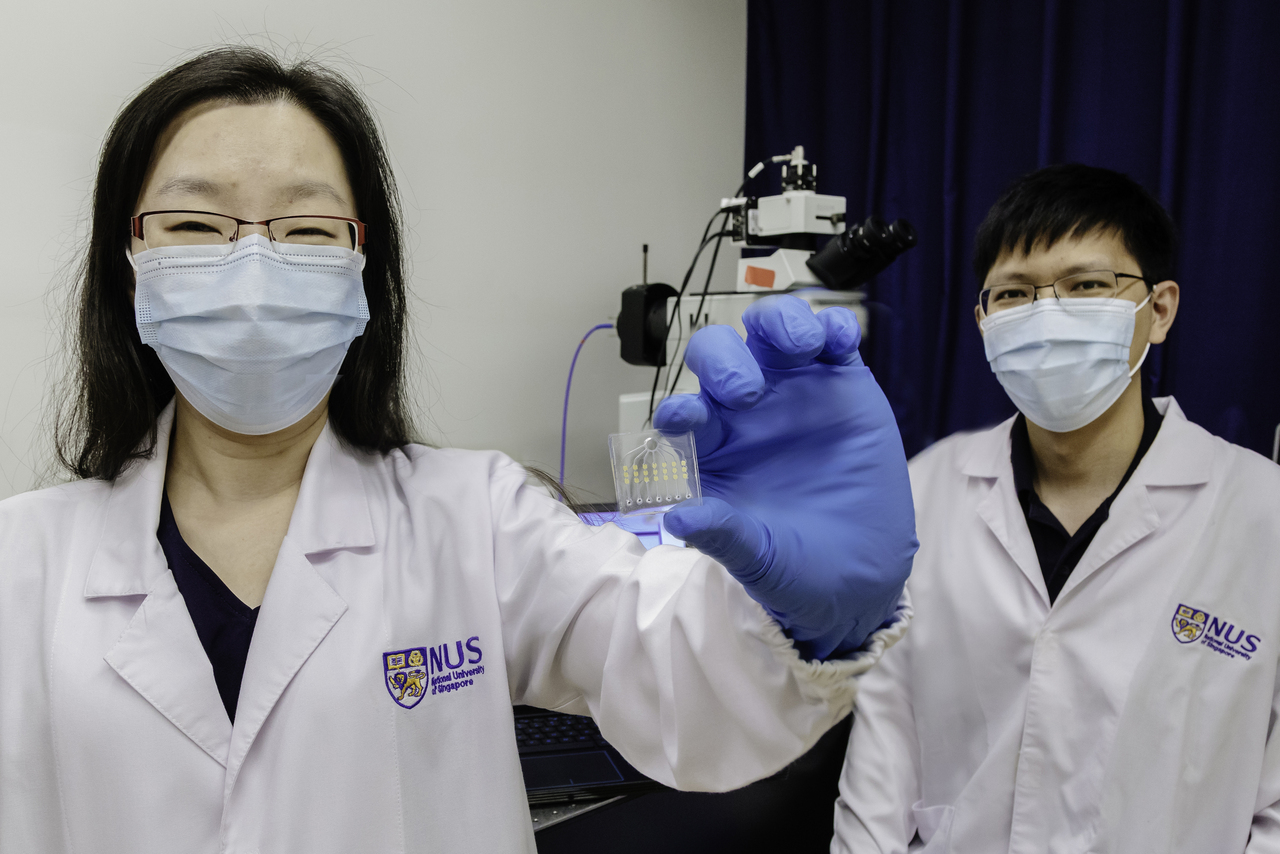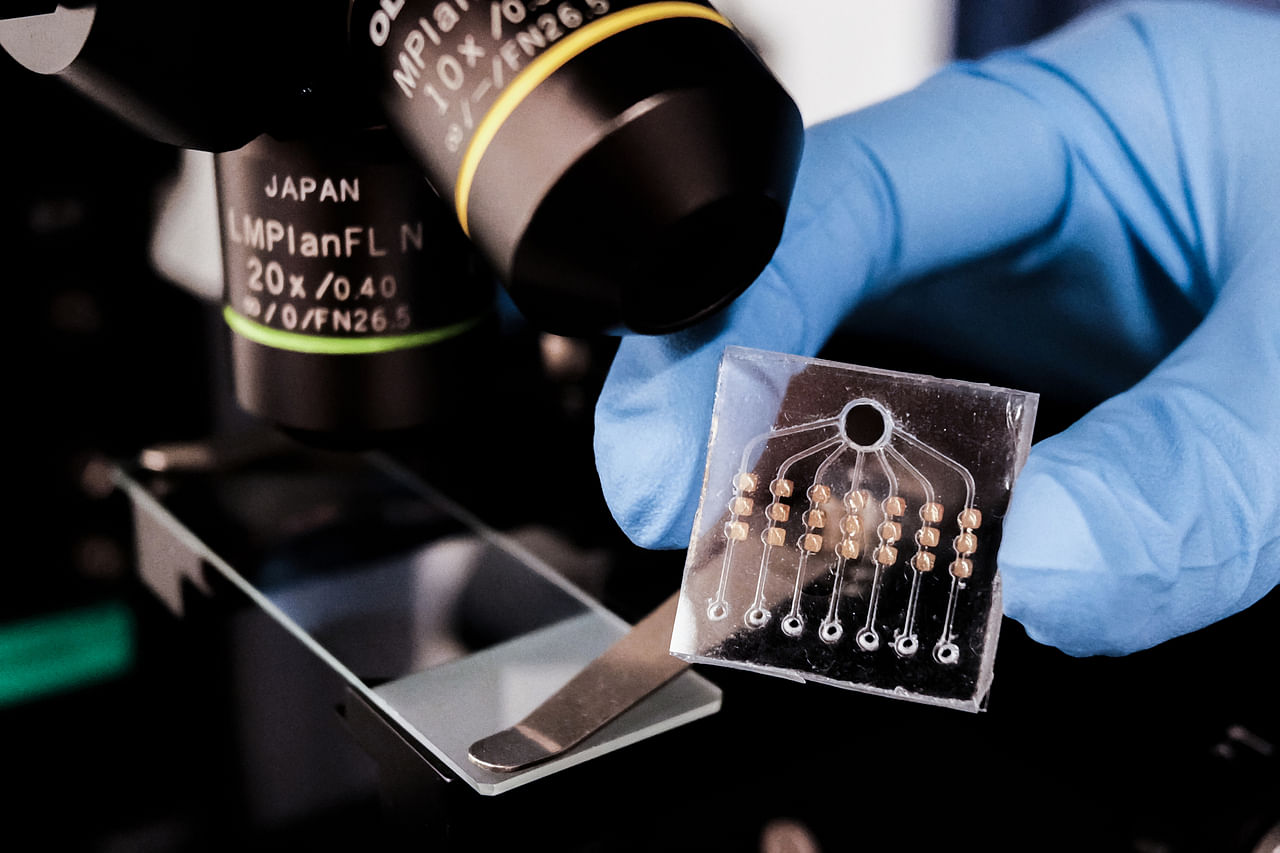Singapore researchers develop blood test for cancer treatment and detection
Sign up now: Get ST's newsletters delivered to your inbox

Assistant Professor Shao Huilin (left), Dr Sijun Pan and their team from the National University of Singapore have developed ExoScope, the technology able to accurately detect cancer drug effectiveness within a day.
PHOTO: NUS
SINGAPORE - Researchers in Singapore have developed a blood test which will not only allow doctors to determine the effectiveness of cancer treatment within 24 hours, but also detect the disease in annual check-ups.
Targeted treatment for cancer, such as immunotherapy, blocks the abnormal growth of cancerous cells by attacking specific molecules which instruct them to grow and spread.
But, to evaluate its effectiveness, clinicians often have to rely on imaging techniques such as MRI and CT scans, which are costly, and can only be determined weeks after the treatment, said Assistant Professor Shao Huilin from the National University of Singapore's Department of Biomedical Engineering and the Institute for Health Innovation and Technology (iHealthtech).
Alternatively, a tissue biopsy, which is an invasive procedure, is carried out, she said.
Prof Shao and her team have now developed ExoScope, which is able to accurately detect cancer drug effectiveness within a day through the use of a platform to identify extracellular vesicles which circulate in the blood. Extracellular vesicles are secreted by cancer cells and carry a variety of "cargo" inherited from their parent cells, including proteins, DNA, RNA and even drugs.
When the cancer treatment is successful, it means that the targeted cancer drug has attached to the cancer cell and interfered with its tumour growth, and so the treated cell will release extracellular vesicles, containing the drug, into the bloodstream.
This will be detected by ExoScope sensors which are able to indicate drug effectiveness, said Mr Zhang Yan, who is one of the authors of the study and a doctoral student from the NUS Department of Biomedical Engineering and iHealthtech.
The research team collected information on different types of extracellular vesicles present before and after being treated with drugs from various targeted therapies.
This enabled the platform to monitor the drug dynamics over time to accurately determine the effectiveness of the treatment and to look out for any signs of drug resistance.
Prof Shao said that, in addition, the platform can be used to diagnose cancer early by detecting extracellular vesicles in the bloodstream.
This could possibly be integrated into a routine blood test for yearly health check-ups, she told The Straits Times.
The team conducted a clinical trial on 106 lung cancer patients who received targeted treatment to validate the effectiveness of the ExoScope platform.
Compared to tumour imaging, which is currently deemed to be "the gold standard" for determining treatment effectiveness, the ExoScope achieved an accuracy rate of 95 per cent when conducted within 24 hours of treatment initiation.
Describing the clinical trial results as "encouraging", Prof Shao said that the blood test can also be used for real-time treatment monitoring, and can lead to more timely treatment decisions.
The team's research findings were published in the scientific journal Nature Nanotechnology on March 8.

A small amount of blood sample can be collected a day after cancer treatment is initiated, and drug effectiveness can be determined in less than one hour.
PHOTO: NUS
Dr Yvonne Ang, associate consultant at the Department of Haematology-Oncology, National University Cancer Institute, Singapore, said that a scan is usually done about eight weeks after lung cancer patients begin targeted therapy which blocks a protein known as the epidermal growth factor receptor. It is the most common treatment for such patients.
"Through a simple blood test, this (ExoScope) technology would allow us to (determine) earlier which patients are more likely to have a good response to treatment. This has the potential to inform us on whether (the patient would need) additional or different therapies," said Dr Ang.
Moving forward, the research team is looking to expand the use of the platform so that it can determine the efficacy of different drugs on a spectrum of diseases, including other cancers, as well as cardiovascular and neurological diseases.
The team has also filed a patent for the technology and are hoping to bring it to market in the next three years.


